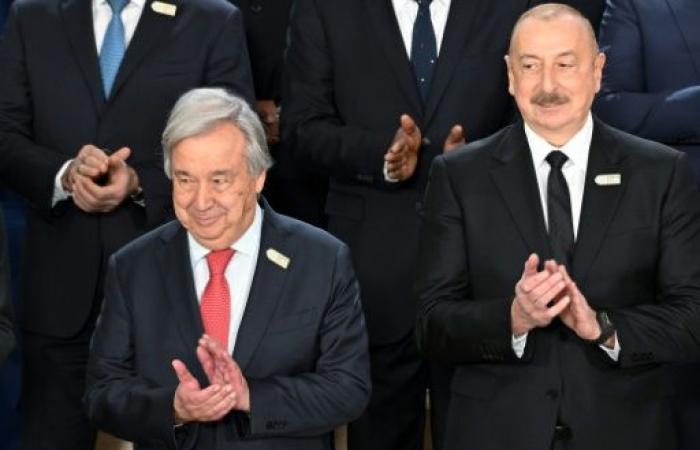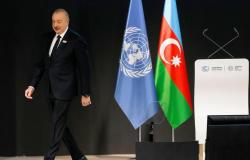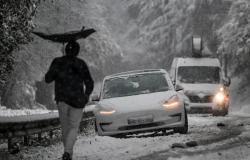Two worlds marched on Tuesday at the podium of the 29th UN conference on climate change, leaders of poor and vulnerable countries calling for redoubled efforts while others pleaded not to demonize gas and oil.
The dozens of speeches by presidents and prime ministers at COP29, which takes place in Baku until November 22, show that the scars of the last COP, in Dubai, are still alive. The countries then adopted by consensus an unprecedented call for a transition towards the gradual exit from fossil fuels.
This year again, the conference is taking place in a major oil and gas producing country. And its president, Ilham Aliev, assumed his expression “gift from God” to designate the hydrocarbons which have made Azerbaijan rich. He recalled that the European Union itself had asked him to supply more gas, after the energy crisis of 2022.
“Any natural resource, oil, gas, wind, solar, gold, silver, copper: these are natural resources and countries should not be blamed for having them and providing them to the markets, because the markets need them” , said Ilham Aliyev. The “fake news media” of the United States, “the world’s leading producer” of fossil fuels, “would do better to look in the mirror”.
Later in the day, one of the few Europeans present, Viktor Orban, the Hungarian Prime Minister who holds the rotating presidency of the Council of the EU, called for “continuing to advance the green transition while maintaining our use of natural gas, oil and nuclear energy.
And to insist: “The fight against climate change must not be against companies, but with them”.
Tax for the climate
| © AFP Barbados Prime Minister Mia Mottley and British Prime Minister Keir Starmer pose for the official photo of COP29, Baku, November 29, 2024 |
But the camp of countries that are very proactive on the climate, or regularly ravaged by droughts, heat waves or floods, has made itself heard.
Zimbabwe is suffering “one of the worst droughts in its history”, said its president, Emmerson Mnangagwa, adding that “the time for half measures is over”.
“Money flows easily finance wars, but when it comes to climate adaptation, they are scrutinized,” accused Maldives President Mohamed Muizzu.
Climate change “has contributed to the death of more than 200 of our compatriots. (…) The planet is sending us a strong signal,” declared Pedro Sanchez, head of the Spanish government, two weeks after the deadly floods in Valencia.
“But in this crucial time for our humanity, we see many governments hesitating and slowing down when they should be speeding up,” he said.
An idea, promoted since last year by the small island of Barbados, France and Kenya, has come back in force to help countries in Africa, the Caribbean and Asia Pacific to invest in renewable energies and strengthen their cities and economies in the face of natural disasters.
 | © AFP Participants at the opening of COP29 in Baku, Azerbaijan, November 11, 2024 |
“Current public financial commitments are not enough, so we need to consider taxes,” Mia Mottley, Prime Minister of Barbados, who is very influential in the global financial reform movement, told the audience. She listed the potential – in hundreds of billions of dollars – for taxes on fossil fuel extraction, maritime transport, aviation and even bonds and stocks.
Most of the leaders of the G20, called upon to contribute the most because of its historic responsibility, are not in Baku.
One of the few present was British Prime Minister Keir Starmer, who announced from Baku the new, very ambitious objective of reducing his country’s greenhouse gas emissions by 2035.
“We are here to show leadership” from London in climate diplomacy, declared Keir Starmer, without answering a central question of the summit: how can climate action accelerate without the United States of Donald Trump?
Increase annual aid tenfold
Baku’s main standoff is to negotiate a new annual financial aid figure for developing countries.
They are calling for a tenfold increase or more of the current amounts ($116 billion per year in 2022). Amounts considered unrealistic by Westerners more inclined to reduce their public spending after deficits and post-Covid inflation.
The negotiations get off to a bad start. On Tuesday, a first draft agreement was outright rejected by negotiators from the southern country in a closed-door meeting.
Speeches from leaders will continue all day Wednesday, including the Russian Prime Minister and the head of the Italian government.






